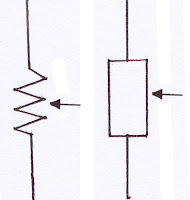Resisitor is an electronic component that provides a barrier to electron transfer. resistor is commonly abbreviated with the letter "R". The resistance of the resistor is measured measured in Ohm, because who find the resistor is George Ohm (1787-1854), a physicist from Germany. Resistor is divided into several types, among other is :
It is the resistor wich the value of resistance can not be altered. So always remain constant, this resistor usually made from nikelin or carbon.
- Resistor not fixed manual
The resistor wich the value of resistance can be changed as desired, by sliding or rotating toggle. These types of resistors can be divided into two, namely potentiometer rheostat or so-called "potentiometer" only, and trimpot (trimer potentiometer). The trimpot’s carbon should not be held, because it is a very sensitive part and can damage frequency. But now many trimpot that have been protected by plastic, so, it’s carbon not be touched.
- Resistors not fixed automatic
The resistor wich the value of resistance can be change automatically according to surrounding circumstances. Examples of tihis resistors are:
+ NTC (Negative Temperature Coefficient) the resistor wich it’s resistance will turn smaller when the temperature gets hot;
+ PTC (Positife Temperature Coefficient) the resistor wich it’s resistance will turn smaller when the temperature gets cold;
+ LDR (Light Dependent Resistor) is a type of resistor that it’s resistance will be reduced when exposed to light.
+ VDR (Voltage Depending Resistor) is a type of resistor that it’s resistance will turn greater when the voltage gets greater
>>>> physical form of resistor
 |
| LDR |
 |
| NTC |
 |
| PTC |
 |
| POTENTIOMETER |
 |
| TRIMPOT |
 |
| Fixed resistor |














Thanks for taking the time to discuss this, I feel strongly about it and love learning more on this topic. If possible, as you gain expertise, would you mind updating your blog with extra information? It is extremely helpful for me. electronic component
ReplyDelete